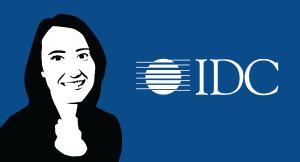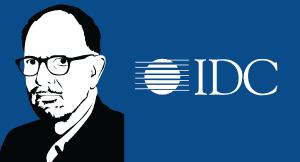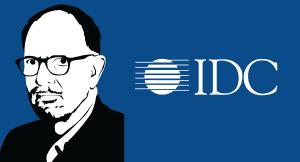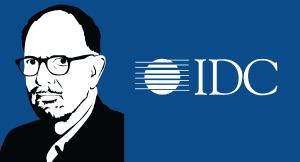Partner:
 Thank you to IDC for underwriting CXOTALK.
Thank you to IDC for underwriting CXOTALK.
It’s that time of new year when you get deluged with analysts / bloggers predictions and prognostications. I join in most years, and of course there’s the IDC predictions process to contend with as well. This year I swore that I was skipping it. I’ve already done the new IDC “Futurescape” document and webcast with my colleague Vanessa Thompson on social technologies, and I suppose that should be enough…but, the pull is strong… alright, no predictions, in fact how about some non-predictions? Actually this post is really more of a state of the industry, a summary of some random thoughts that I’ve been mulling over for the past few weeks. Maybe I should have called it random thoughts on software, business and digital transformation, but it already has a name so here you go, in no particular order: 1. Customer experience (CX) strategies are more important than ever. As tired as this topic may seem to many of you, this is still one of the top initiatives for most companies today and an area where companies are struggling. There is a lot of budget being spent, the results are mixed, many customers are not seeing results but some companies are winning big by "getting it right". Providing a good CX across all channels is just hard, face it. There are many issues here that still need to be resolved for most companies. these include data silos (and these silos are increasing in many companies, you must get a complete view of the customer including transactions, social data and consensual data from communities, etc.), system silos (and again, these are getting worse as companies / departments add disconnected solutions to try and address pieces of the strategy), poor workforce management, poor difinitinos of "customer facing" organizations, outdated business processes (including sales, marketing and service of course, but also logistics, product planning, finance, etc.), lack of executive support for initiatives, and probably a dozen other things I'm forgetting. I'm not going to try and provide a map to successfully building a CX strategy in this post, it would be 500+ pages long, but I will say that building and executing a flexible, adaptable and comprehensive CX strategy is critical. 2. The nature of getting work done is changing. We have done several workforce transition threads this past year, and I'd say this is an area that is heating up quite a bit as we learn more about the changes that are impacting how work gets done and how companies can increase productivity. There are a lot of dimensions here that range from new tools and processes to behaviors and dealing with change. The use of networks is a key technology and can help facilitate behavioral changes but that's not enough. I've written before about the productivity gap and how social technologies and new platforms can help close it in the future, so I won't go back through that discussion here, but it is still very relevant. There's also a whole thread around sourcing - hiring - training - retaining the modern workforce that is connected to social technologies and better employee experiences. There are underlying changes happening to the employee - employer relationship, with more outsourced or consultative engagements becoming the norm. Internet and project technologies have also opened up the ability to break processes into micro tasks and distribute the work differently and in a flexible model which will impact the type of work many employees will do in the future (see the comments on business networks later in the post).
I read something the other day (sorry, don't remember the source) about moving beyond knowledge work. The concept was that it's not about knowledge anymore but instead about your ability to learn new things. I get the concept but to me it is really misguided and naive to think that from a worker perspective it's only about your ability to learn and not about your knowledge, experience and skills. The modern worker, or knowledge worker (KW) has to be adaptable, no doubt, but the biggest shift is in the activities themselves. The KW applies experience and knowledge to business decision making using new collaborative tools, data / analytics and increasingly technology assistive technology like cognitive computing and artificial intelligence (AI). The ability to synthesize inputs (data, predictive analytics, prescriptive analytics, cognitive assistance and AI) into business decisions and strategies to drive better outcomes is the new nature of work IMO.
I am for the moment ignoring robotification (but if you're interested this Wired post is a pretty good primer), that would most definitely get into the land of predictions and well...
3. Commerce is moving beyond channels and silos and will converge into a more seamless experience. Consumers are growing very tired of the segregation of channels that many businesses seem to have accepted as normal. Around the edges this is eroding though, as more companies start to think of the complete experience and not segregated on and offline. If I want to shop in a physical store but order off my mobile device for home delivery all in one experience shouldn't that be an acceptable model? And the reverse is also true, I want to research and shop online but pickup and inspect in a physical location. Add to that the new beacon technologies that can put context and identity into the experience and the convergence should accelerate and include loyalty, promotions, community, etc. Since I just posted on digital wallets, I'll leave that off here for now.
4. The modern business is becoming a network of connected entities. Yes, I've talked about business networks for a few years now, but finally the concept is getting a lot of attention and I think we clearly now see where current businesses are being successful in transitioning. There are three areas business networks are adding significant value to businesses today, 1. CX / Communities. 2. Enterprise Social Networks (ESN), and 3. Commerce / Marketplaces. Customer communities have become a key part of many CX strategies and play an important role in collecting and integrating the voice of the customer into a business and it's innovation process. ESN's are the backbone of the new collaborative workforce and are becoming a part of the business processes of many companies. They also provide an important conduit for getting people and data together to drive better business decisions / outcomes. The marketplace model is an importnat part of the current business model innovation trend. The oldest part of business networks fall here, the supplier network (i.e. Ariba) and marketplaces like eBay and Amazon, but we're seeing this model explode across many different markets in the past few years. Capital markets have moved into the marketplace model with crowdfunding sites like KickStarted and Indiegogo. What was perhaps inaccurately called the "sharing economy" also leverages the marketplace model with companies like Airbnb and Uber leading the way (we should probably call this the rental economy as we all see that it's not about sharing but about creating value). The marketplace model is also redefining how companies can get access to critical data sources that will feed decision systems across a broad range of business functions including marketing, sales, service, product design, etc. in what are being called data clouds or data as a service (DaaS).
5. Cloud is simply the way businesses consume new technologies and forms the foundation of the new business platform. In other words it's not a new edge technology but simply the way that modern applications (services), platforms and utility computing services (like storage, data, security, etc.) are consumed. Companies are increasingly accepting and utilizing the cloud for IT modernization and busniess competitive advantage. Cloud platforms have huge potential, especially when combined with the concept of micro services, to disrupt the application landscape and become the new source of value for delivering business processes to the enterprise.
6. Stop talking about mobile as if it's a new / different way of working. I don't want to hear "mobile first" strategies anymore, it's not about mobile, it's about working anywhere with whatever device I have handy. Tech vendors can't dictate the end point technology anymore, the user does. Instead make the technology just work no matter what device I happen to use!
7. The world's a scary place and online is no exception. 2014 was the year that we all saw hacking and security as a threat to everyone who has a connected device. Personally I had to change debit cards three times due to hacking and even had one credit card somehow dublicated physically. There are scary places with little or no regulation where hackers are multiplying and adapting as quickly as security companies can deploy new / better system security. And worse than that, many companies still have huge holes in security that they are ignoring. We've even gone beyond private hacking and are now entering (well, really now aware of) the time of cyber warfare and state sponsored cyber terrorism.
8. Privacy is not an outdated concept but both your concept of privacy and the way we provide privacy protection have to change. In a world where technology changes in an almost continuous cycle we have to adapt our concept and methods to provide an acceptable level of privacy to everyone. That doesn't mean that the base definition of privacy might change, I'd argue that it already is/has. What it does mean though is that governments and businesses have to adapt to the technology changes by making regulation and policies that meet theose technology changes. In other words the rules need to keep up with the technology, not the other way around. This is a serious problem when the people making the rules are not tech savvy in any way, and make no effort to understand the technology (I'm referring to the US Congress and Judiciary, but I'm sure it applies in other countries as well).
9. Data silos are the enemy of the modern business. Okay, I know this seems obvious, but is it. I recently had a conversation with a friend at a large financial institution who had been tasked with providing a consolidated view of the institutions customers. Now you'd think that this person would be in IT, or at least have IT support for this project (you might also be surprised that in 2015 we're talking about starting to build a complete customer data model, but that's just the reality of most businesses) but that was not the case. Line of business (LOB) tasks with building a plan to consolidate data across multiple systems in even the most rudimentary way is a serious challenge but more and more, it's the reality that many businesses face. No matter who is tasked to solve the problem, we have a serious problem in most businesses with customer, employee, product / service data. And in many companies LOB is adding new cloud based systems to try and solve other operational problems, but adding new system silos just makes the data silo problem worse. Big data, smart data, small data, predictive and prescriptive analysis and just basic business decision making depends on complete data pictures so if you can't bridge the silos, all of the other benefits are unavailable. 10. Net neutrality is a fight we must continue to pursue. I get very frustrated over this subject and I did already write a fairly long post on it last year so I guess I won't go back into my rant here. Still I have to say, we cannot ignore this topic, there are too many large, well funded threats to the free and open Internet today to let it fall off our radar.
So that's my non-predictions for 2015, what do you think? Feel free to add more in the comments. Oh, and Happy New Year!
Presented By: IDC
Jul 16, 2015





